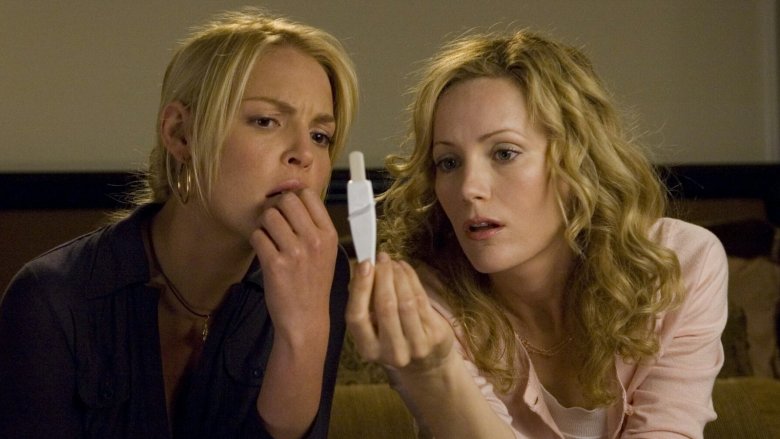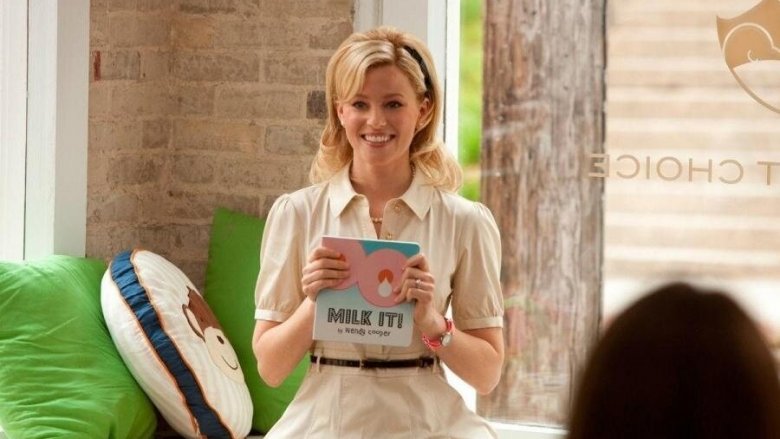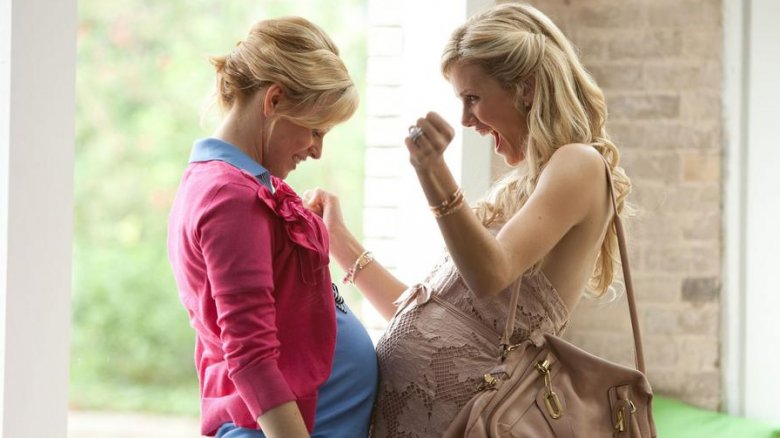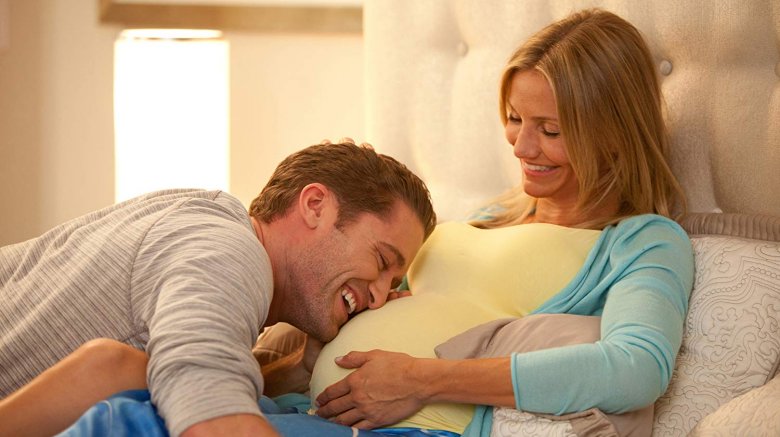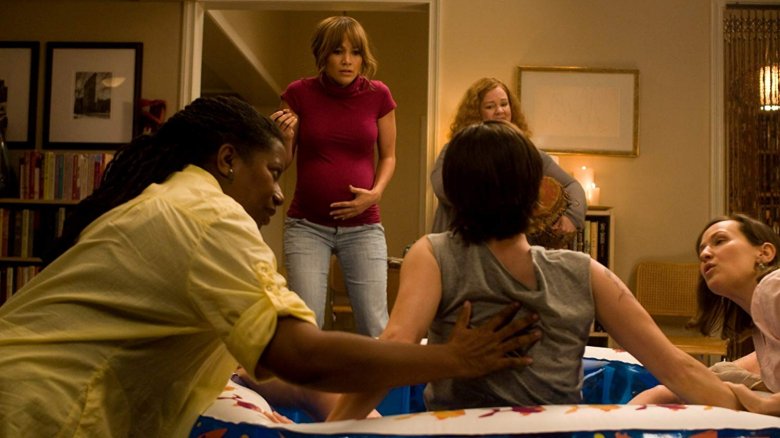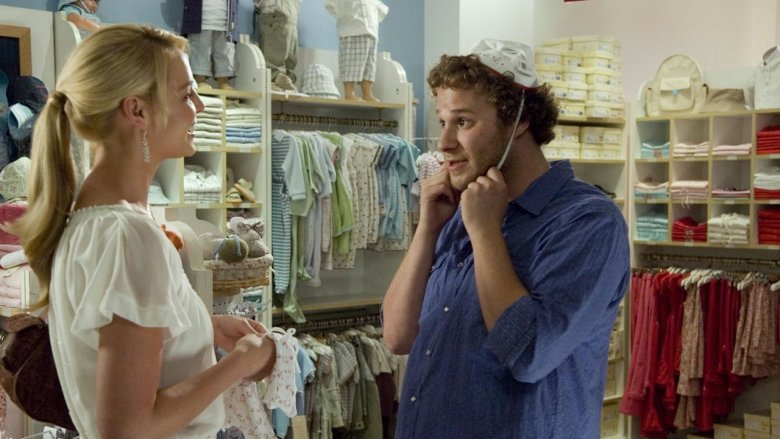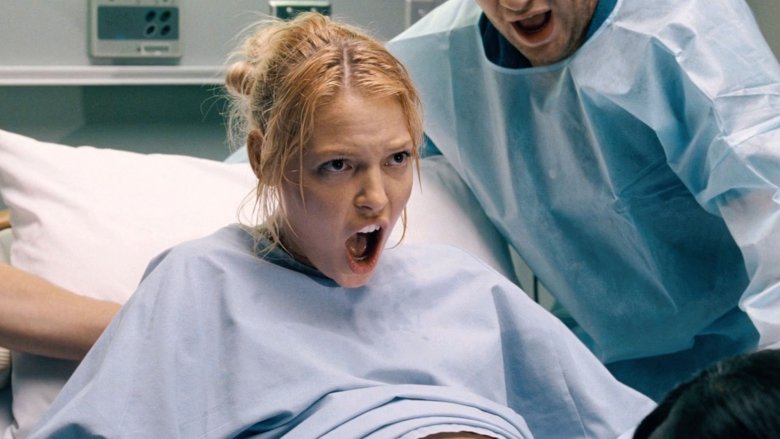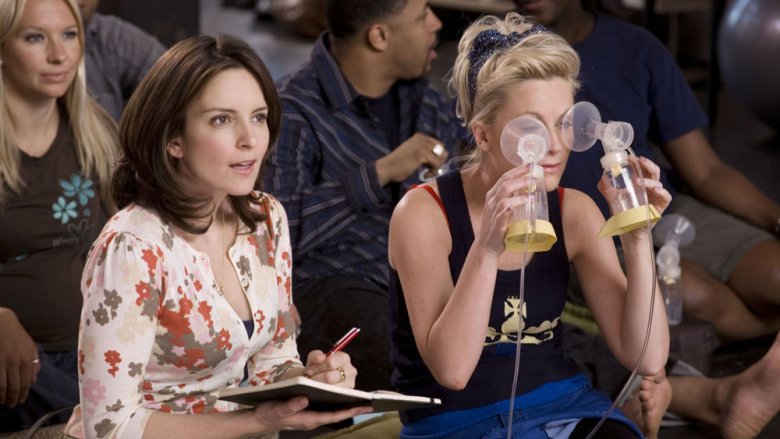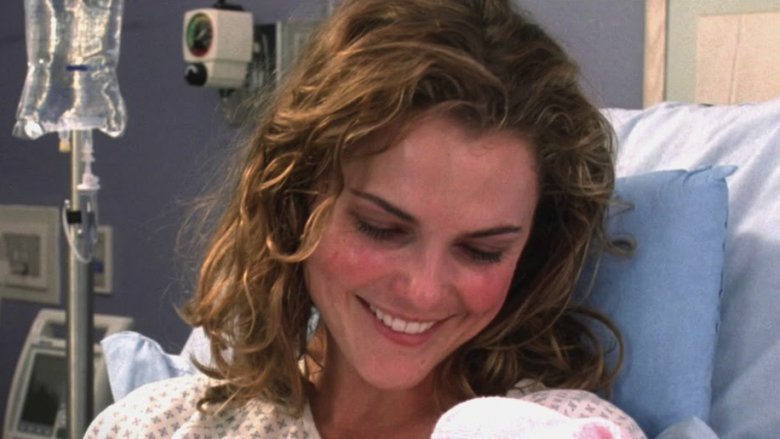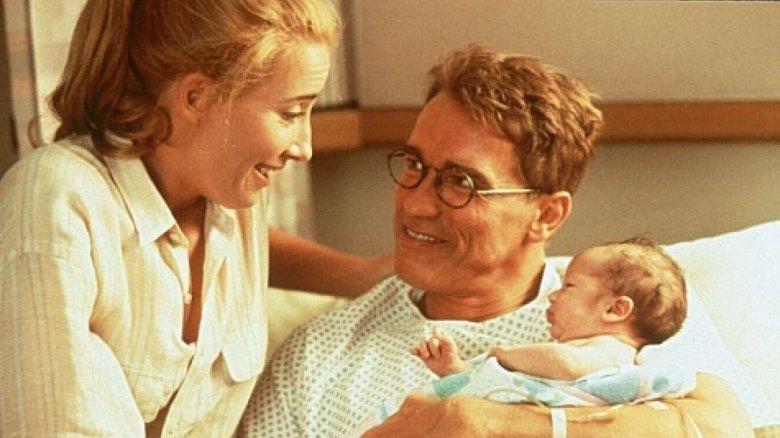Things Movies Always Get Wrong About Pregnancy And Childbirth
Pregnancy is simultaneously one of the most stressful and wonderful things a woman can go through in her life. Aside from everything our bodies must endure during the nine-month gestation period, there's also the little matter of childbirth to consider. Hollywood has been criticized since time incarnate for mistreating its female characters and, although the tide is very slowly changing, movies still don't seem to understand what it's like to really be pregnant or to give birth.
When it comes to pregnant ladies on film, there's a tendency to present expectant mothers as shrill, irresponsible, or downright unprepared for what's to come (not to mention what's already happening to their bodies). Pregnancy is showcased as both the scariest thing to ever befall a female character and the change that makes her her most beautiful self. Experts have weighed in on what movies get wrong about pregnancy, and these are their biggest gripes.
If there's an issue, it's always with the woman
According to Corey Burke, Tissue Bank Director at Cryos International in Florida and an andronologist and embryologist with more than 18 years experience in the field, movies typically blame women whenever there's any pregnancy-related issue. "The woman is usually positioned in movies as the one who is infertile, but ... women and men are equals when it comes to infertility. Infertility affects all ... with approximately 30 percent of cases being related to male infertility issues. Simply put, that's approximately the same as women," he explained.
This is a familiar trope from movies as far-ranging as The Help and Legends of the Fall, which, lest we forget, finds a woman blaming her own infertility for some bozo leaving her. In mega-hit What to Expect When You're Expecting, Elizabeth Banks memorably breaks down at a baby expo. After struggling to conceive, she realizes pregnancy isn't all it's cracked up to be.
There might be significant change afoot in this category, however, as indie darling Private Life, which featured Paul Giamatti and Kathryn Hahn as a middle-aged couple struggling to conceive, took a more sensitive approach to infertility struggles.
It's easy for women over 40 to get pregnant
On the flip-side, if Hollywood is to be believed, women like Hahn's character in Private Life shouldn't have any issues conceiving once they hit the big 4-0 and beyond. Take the hilarious and sweet Bridget Jones's Baby, a film that, although its heart is definitely in the right place, still treats Renee Zellweger's titular character as a woman so likely to get pregnant she spends much of the movie trying to figure out who the father is. In one supremely awkward scene, she deviates between the dreamy Mark Darcy (Colin Firth) and newcomer Jack Qwant (Patrick Dempsey), both of whom could be her baby daddy.
As Cryos International's Corey Burke explains, getting pregnant over 40 is certainly possible, but it's highly unlikely to happen without outside assistance. "Women over 40 have a decreased ovarian reserve and egg quality which often leads to difficulty conceiving," he said, cautioning, "Their ovaries have surpassed the point at which they produce high-quality, healthy eggs. In fact, women over the age of 40 are said to only have a 5 percent chance of getting pregnant naturally each month."
You need to find Mr. Right
Bridget Jones had two dreamy suitors eager to help raise her unborn child, but there was never a suggestion she'd even consider bringing up the baby on her own. This is prevalent in pregnancy-related movies. It's sadly rare to see a woman getting ready to take on raising a child alone. Weirdly, this is even true of Juno, which ends with the titular character giving her baby up for adoption. In a movie as progressive as this one, Juno still cannot end up alone herself and she retreats back to the blandly sweet Paulie. If she kept the baby, would Juno have kept him too?
As Burke explains, "Hollywood tends to stigmatize women getting pregnant without a partner. It's typically portrayed as the partner leaving and/or the pregnancy being a surprise — instead of the female making a deliberate choice to start a family on her own as a single mother by choice. In reality, a lot of women are thinking about becoming mothers even if they have missed out on finding Mr. Right. They know that time is limited and if they plan to use their own eggs they need to freeze them, look to fertility clinics or choose the DIY home insemination method for help in becoming pregnant."
Pregnant women are vacuous
As Risa Klein, CNM, OB/GYN NP, M.S. (The Manhattan Midwife), a senior midwife based in New York City who's acted as a birth consultant on two movies (Maze and Baby Mama) explains, pregnancy changes women forever. Unfortunately, movies don't present this reality effectively. "Hollywood depicts women as objects, with birth coming at them, rather than a woman actually being an active participant in the process [and] traversing emotions as she brings her baby into the world, entering new motherhood. Her life is forever changing, and yet in Hollywood, we see women being depicted without individuality, or their life story and accomplishments," she explains.
This is true of essentially every mainstream movie depicting pregnancy, from Bridget Jones's Baby to What to Expect When You're Expecting. The latter is a particularly egregious example as it depicts big-name actresses like Elizabeth Banks and Cameron Diaz flapping about in a panic as they prepare for their new roles as mothers. In particular, Brooklyn Decker's Skyler is a flighty, ditzy woman who breezes through her pregnancy, much to the annoyance of Banks's Wendy, who's struggling. Even Skyler's birth is glamorous and goes off without a hitch (with hilariously minimal pain).
Birth is shown as a mechanical process
If there's one aspect of pregnancy Hollywood is intent on showing in the most dramatic manner possible it's childbirth. The best example is arguably the super-cut of everybody giving birth from What to Expect When You're Expecting, which shows Cameron Diaz's character screaming through delivery and Elizabeth Banks' character in the operating room as doctors perform a C-section. Aside from scaring women off getting pregnant, there's a more insidious issue with this kind of approach: it doesn't show the connection between mother and baby.
As Klein explains, "I work hard in my midwifery practice to keep women confident, present, and connected with their babies during pregnancy and labor. ... I believe that each woman I work with has a unique life story, and this is an overlooked aspect of prenatal care. Women I work with are guided to be aware and deeply connected and in love with their babies during labor." Rather than, you know, just painfully pushing 'em out and getting it over with.
Midwives are only for crisis pregnancies
Generally, when a midwife shows up in a movie, it's because the mother-to-be is hysterical, somebody crucial is missing (usually the father or birth partner), or something else has gone horribly wrong. In The Back-up Plan, for example, the home birth is a mess of bodies with everybody rallying around the expectant mother, effectively making the birth a chaotic scene (check out Melissa McCarthy's Carol, banging a drum like a crazy hippie).
Klein reckons movies have a responsibility to show empowered women with caring birth providers looking after them. "These stage moms could become positive role models for women of childbearing age watching the films. Wouldn't it be terrific if the movies could actually help reduce C-section rates, by showing labor as a natural process and life event, and help reduce maternal and infant mortality and morbidity?" she argues.
As a midwife herself, Klein would like to see Hollywood using more professionals like her as birth attendants on movies "to spread the message that midwifery care is for low risk women."
Women are ill-prepared for childbirth
Let's face it — if a woman in a movie is prepared for her baby, there's no story. It makes sense, then, that films such as Knocked Up, starring Katherine Heigl and Seth Rogen as a couple whose one-night stand results in an unplanned pregnancy, do such big business.
Klein notes that the main thing she learned from working on the movie Baby Mama was that, "Hollywood needs to do their research on how women are preparing for birth — as to not depict them as less than prepared. Not to mention providers ill prepared to work with a woman about to meet her new baby!"
As she advises, childbirth is a massive achievement and movies should treat it as such. "Hollywood presents the process of childbirth as something we don't have to take seriously, and we should. Women deserve respect and Hollywood needs to write the parts," Klein argued emphatically.
It's really easy to get pregnant
Movies frequently portray couples getting pregnant the first time they even try — or by accident (take Bridget Jones's Baby and her two possible daddies, for example). But, as Dr. Mary Jane Minkin, MD, FACOG, a board-certified OB-GYN, and Kara Manglani, CNM, a nurse-midwife and fertility specialist, told Insider, it's not super likely a couple will hit the jackpot immediately. As Minkin explained, desperately wanting to get pregnant and then not being able to and feeling terrible or even guilty or ashamed about it is emotionally taxing enough. Movies often compound these feelings with inaccurate depictions of the process.
Manglani agrees, arguing, "The best way to broaden the conversation is to remove the stigma ... Women feel like they shouldn't mention their journey to conceive, and when they don't quickly become pregnant they become isolated and alone." Likewise, films don't get into the everyday nitty-gritty, like "first morning temperature readings or the ovulation predictor kits." Both stressed it's not likely a couple will get pregnant right off the bat when they first start trying, regardless of what Knocked Up, Bridget Jones's Baby, and other films would have us believe.
Excruciating pain is the name of the game
Movie births are painful, often excruciatingly so (aside from Brooklyn Decker's sneeze-birth in What to Expect When You're Expecting, of course). That's just the reality films present. In a piece for Salon, however, physician and writer Rahul K. Parikh discussed the merits of pain relief and the problem with movies making the birthing experience seem even scarier and more painful than it actually is.
Parikh actually points to the infamous birth scene from Knocked Up to illustrate how Hollywood treats the moment "like an exorcism." As he argues, "The goal of childbirth isn't to scream at the top of your lungs. Rather, it's to focus that energy down on the pelvis to push the baby out, instead of wasting it contorting your body and castigating your partner."
He argues that pain relief isn't something to be ashamed of, but regardless childbirth isn't regular pain. "There is a line of modern thinking that suggests pain is an important, even essential, part of birth. Several studies (including this one) have shown that the labor pain is fundamentally different from pain of disease or physical trauma, suggesting, perhaps, that there is higher purpose to it," he advises.
Contractions immediately lead to birth
Birth may be loudly painful in movies, but it's a remarkably extradited process too. As Kecia Gaither — MD, MPH, FACOG, double board-certified in OB/GYN and Maternal Fetal Medicine, and director of Perinatal Services at NYC Health + Hospitals/Lincoln — explained, in films, "As soon as the woman's water breaks, [she] begins hooting and hollering with contractions. Contractions may precede rupture of membranes, or they may be delayed for hours or days after the membranes break. If they break prematurely, i.e. before 37 weeks, contractions may not ensue for days to weeks."
This means that each time we've seen a female character's water break on film, only for her to immediately start experiencing contractions and make the mad dash to the hospital to start screaming her head off (i.e. give birth), it's been a fallacy. Take Baby Mama, the rather lovely Tina Fey-Amy Poehler pregnancy comedy that Dr. Risa Klein assisted on. Once Poehler's character's water breaks, she's rushed to the hospital. And while she seems completely fine the whole way there, all of a sudden, we cut to her in excruciating pain with her contractions and confined to a wheelchair. The baby arrives soon after, natch.
Skin remains perfect and unblemished
Hollywood is more likely to show a pregnant woman who looks like the gorgeous Cameron Diaz than one who resembles the average lady, but do these actresses have to look so good on film? It's not just the incredibly done-up examples, like Diaz's co-star Brooklyn Decker in What to Expect When You're Expecting, but even the sweatier types like Diaz herself in that very same movie or Katherine Heigl in Knocked Up — everybody looks stunning giving birth. Check out Keri Russell in Waitress, glowing and gorgeous immediately afterwards.
As Dr. Kecia Gaither explains, there are actually lots of dermatological conditions that can come up during pregnancy. "Some women will develop 'the mask of pregnancy' also called cholasma. There will be a perceptible darkening about the face ... due to the hormonal influences on the melanocytes — or those cells responsible for pigmentation. Most women additionally get the 'linea negra' or the black line down the abdomen. I've never seen a pregnant woman [in a] film with either. All the bellies are perfect, too, and the faces are perfect," she stated.
There's no bodily swelling aside from the belly
Speaking of bellies, not only do pregnant bellies look fantastic and almost aspirational in movies, but they also seem to be the only part of these women's bodies that react at all to the pregnancy. The character posters for What to Expect When You're Expecting are so blatant in this regard they might as well have just had each actress shove a pillow up her jumper and be done with it.
Gaither notes, however, it's not just the belly that swells or changes shape during pregnancy. "Women can swell. Hormones regulate the amount of water retention had during pregnancy — therefore you can get facial, hand, legs/feet swelling. All the pregnant ladies I see on TV/in films don't look swollen to me," she noted.
In her stand-up special Growing, Amy Schumer infamously lifted up her dress to show the audience the Band-Aids holding her bellybutton in shape, cutting through all the rubbish perpetuated about how perfect pregnant ladies look in Hollywood. Hell, this stereotype is so prevalent, even Arnold Schwarzenegger himself doesn't look that swollen throughout his character's pregnancy and child birth in Junior. Can we just get realistic pregnancy bodies already?
